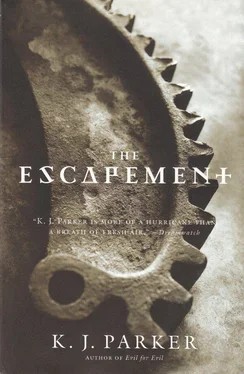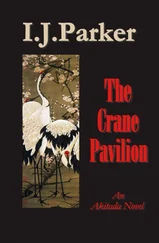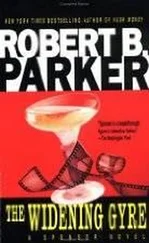K Parker - The Escapement
Здесь есть возможность читать онлайн «K Parker - The Escapement» весь текст электронной книги совершенно бесплатно (целиком полную версию без сокращений). В некоторых случаях можно слушать аудио, скачать через торрент в формате fb2 и присутствует краткое содержание. Жанр: Фэнтези, на английском языке. Описание произведения, (предисловие) а так же отзывы посетителей доступны на портале библиотеки ЛибКат.
- Название:The Escapement
- Автор:
- Жанр:
- Год:неизвестен
- ISBN:нет данных
- Рейтинг книги:4 / 5. Голосов: 1
-
Избранное:Добавить в избранное
- Отзывы:
-
Ваша оценка:
- 80
- 1
- 2
- 3
- 4
- 5
The Escapement: краткое содержание, описание и аннотация
Предлагаем к чтению аннотацию, описание, краткое содержание или предисловие (зависит от того, что написал сам автор книги «The Escapement»). Если вы не нашли необходимую информацию о книге — напишите в комментариях, мы постараемся отыскать её.
The Escapement — читать онлайн бесплатно полную книгу (весь текст) целиком
Ниже представлен текст книги, разбитый по страницам. Система сохранения места последней прочитанной страницы, позволяет с удобством читать онлайн бесплатно книгу «The Escapement», без необходимости каждый раз заново искать на чём Вы остановились. Поставьте закладку, и сможете в любой момент перейти на страницу, на которой закончили чтение.
Интервал:
Закладка:
The look she gave him made him want to laugh, or to smash her face in. "Really?" she said. "Who's that, then?" He kept his face still and straight, but under the table he clenched his fists till they hurt. "Ziani," he replied.
17
He was right. It took no time at all. Later, it was estimated that a third of the Mezentine dead were killed when Daurenja exploded his mine, either by the force of the blast, or by injuries caused by being thrown into the air, or by falling debris. The Aram Chantat disposed of the rest. An Eremian officer who arrived with unnecessary reinforcements halfway through the operation said it reminded him of killing rats in a barn: you lifted up a trough or a feed bin, then clubbed or stamped on them as they scurried frantically past. They hardly fought at all, he said, like it simply didn't occur to them to try using their weapons. In fact it was an Eremian officer, Major General Miel Ducas, who coordinated the reduction and elimination of Mezentine forces on the embankment after the breach had been made. His approach was simple but effective. Having used flying wedges to split up the mass of the enemy, he pressed them back against the City wall, surrounded each segment in detail and let the Aram Chantat get on with the job. In spite of their enthusiasm for the work, even the Aram Chantat eventually grew tired from the sheer effort of cutting bone and hammering metal, so he organised them into shifts, a fresh unit coming in to relieve the executioners when they grew too weary to continue. The number of Mezentines killed on the embankment was never reliably established, since a great many bodies were buried under the spoil and rubble; Chairman Psellus later put the figure at twelve thousand, but this was generally held to be an excessively conservative estimate.
Because the chairman was otherwise engaged when the embankment was breached, and all his superiors in the chain of command were killed or severely injured, or disappeared and couldn't be found, Colonel Zosoter of the artillery took charge of the defence of the forward positions and the evacuation of the survivors. He had precious little to work with. The enemy's flying wedge tactics meant that his forces were fragmented into isolated segments, and he was unable to communicate with them given the risk-practically a certainty-that any message he sent would be intercepted by the enemy. He was confident that the gates would be opened to let the survivors back in, and acted on that assumption, falling back on the gatehouses as the enemy pressed home their assault.
The gates stayed shut.
When it became apparent that Chairman Psellus had abandoned him, Colonel Zosoter ordered his men to lay down their weapons and surrender, on the entirely reasonable assumption that the enemy took prisoners. He was wrong about that, too. He had her escorted to the top of the Chandlers' bell-tower, whose window overlooked the main gate. She didn't want to look, insisting that it was none of her business, and she'd done nothing wrong.
Psellus had always taken refuge in the fact that he wasn't a violent man. He hadn't even tried to hurt anybody physically since he was eight years old. He reached out as if to pat her comfortingly on the shoulder, wound his fingers in her hair and tugged till she gasped. Then he twisted her head to face the open window.
"In that case," he said, "there's no reason why you shouldn't look."
She swore at him, but struggling made it hurt more. "Let me go," she said. "I've got my eyes shut."
"If you don't open them," Psellus said gently, "I'll push you out of the window."
She called him some names he didn't actually understand, though he got the general idea. He leant against her gently, and she screamed.
"Look," he said.
(Afterwards, he felt very badly about it; partly because he thought he'd let himself down, partly because if she hadn't opened her eyes, he was sure he would have pushed her out, and killing her would have meant the end of any hope of saving the City. He was also deeply disturbed by how thrilling he found the texture of her hair and the softness of her body as he pressed against it. Just as well, in fact, that she gave in when she did, and opened her eyes.)
She said nothing; and after thirty seconds or so, he relaxed his grip on her hair and let her pull away. She glared at him, as though he'd trodden on her foot.
"I agree," he said. "You've done nothing wrong. You just wanted to be happy. But now you can see why you've got to help me. Otherwise, they will break in here, and they will kill you. Ziani won't be able to stop them."
She frowned. "I never thought we'd lose," she said. "I thought we'd win. We always win, don't we? We're better than everybody else."
He shook his head. "We're better at everyone else at some things," he replied. "The things that matter, naturally. But they're stronger than us, just as I'm stronger than you. One thing this has taught me, you can't win against brute force if you're weaker."
Her frown deepened; it was as if he was insisting that two and two made five. "But they're savages," she said.
"Yes. And savages are better at fighting than we are. We've always tended to see that as evidence that we're superior to them. I'd like to believe that's true, but I'm beginning to have my doubts. Now, will you do what I asked you?"
She nodded. "I don't have a choice, do I?"
"Not really," he said. When it was all over, the Ducas reported to General Daurenja, who nodded and smiled at him. "Thank you," he said. "You've done well."
The Ducas made some formal gesture, which the general assumed was an Eremian military salute. "Just doing my duty," he said.
"Carry on," the general replied.
Miel left him and walked slowly back towards the ditch. The Mezentine dead were piled up like grain sacks waiting to be loaded, a great wealth of commodities. He paused, stooped and turned over a body at random. Then he searched it, taking a bronze cloak-pin, a finger-ring, a linen handkerchief and twelve dollars cash.
An Eremian soldier was watching him. He straightened up, dropping the goods he'd taken into his pocket, and nodded affably. The soldier saluted.
"We made them pay for what they did to us, didn't we, sir?" the soldier said.
Miel raised his eyebrows. "I suppose so, yes," he replied.
He walked down the steep slope formed by the collapse of the embankment, concentrating to keep his balance. Around him he was aware of men calling out (the wounded, too badly hurt to move; it reminded him of the bleating of sheep), and thought of the expression the scavengers used: live one here. Of course, they made a point of salvaging any wounded men who could be expected to recover, and putting the others out of their misery. He envied them their humanity, but reflected that it had done them no good in the long run. If they hadn't spared him, they'd probably still be alive now.
The ditch was easy to cross now; they'd brought up planks and laid them on top of the rubble and dead bodies, making a road wide enough to drive a cart over. He noticed the silence, and realised that the Mezentines had given up shooting from the wall batteries. It made sense, of course, to conserve their ammunition. He thought about the hail of scorpion bolts that had wiped out Orsea's wretched attempt at an invasion. Now it was the other way around, like a reflection in a mirror; a different angle, but the same thing.
He remembered saving Daurenja's life, when Framain and his daughter had wanted to kill him. It had been the act of a humane man. He couldn't imagine those circumstances arising now. He wouldn't have got involved in the first place.
He crossed the ditch and walked slowly up the trench, labouring through the mud, working out in his mind how to approach the task of clearing up the mess. Burial details: first, of course, the dead would have to be stripped, the recovered goods sorted into piles: military equipment in one heap, personal items in another. Carts to haul away the armour, weapons, bales of clothing, footwear; sacks for the rest. As he understood it, the correct procedure was to appoint a factor to take charge of the salvage, notify the principal dealers and organise a series of auctions. The proceeds of sale of the military equipment went back into consolidated funds, while the private property of the dead went into a separate fund, to be divided up between the soldiers who'd taken part in the relevant action. The important thing was to make sure that everything was visibly fair and equitable. The factor, if he remembered correctly, took five per cent of the gross. He was sure the general would give him the job, if he asked politely.
Читать дальшеИнтервал:
Закладка:
Похожие книги на «The Escapement»
Представляем Вашему вниманию похожие книги на «The Escapement» списком для выбора. Мы отобрали схожую по названию и смыслу литературу в надежде предоставить читателям больше вариантов отыскать новые, интересные, ещё непрочитанные произведения.
Обсуждение, отзывы о книге «The Escapement» и просто собственные мнения читателей. Оставьте ваши комментарии, напишите, что Вы думаете о произведении, его смысле или главных героях. Укажите что конкретно понравилось, а что нет, и почему Вы так считаете.












